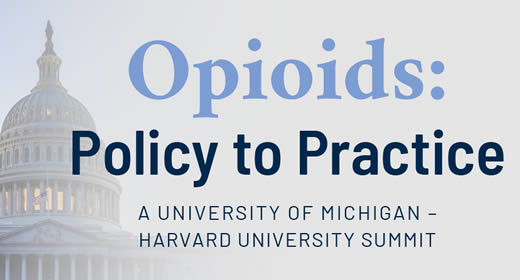Opioids: Policy to Practice
A University of Michigan - Harvard University Summit
Date & time
Location

A full list of speakers and topics as well as registration information is available on the official U-M-Harvard Opioid Summit website.
Registration and waitlist
Registration is now open for a live webcast, which will run from 8 a.m. to 3:30 p.m. Members of the community who work in public policy, health insurance and community health are especially invited to register. Registration is required for webcast viewers. The summit hashtag is #OpSummit19 and the event will be live-tweeted. A video recording will be available after the summit. Register now for the live webcast or add your name to the in-person waitlist »
About the summit
With the opioid epidemic affecting millions of Americans every year, leading universities have become hotbeds of research and innovation aimed at improving prevention, treatment, public policy and community response. The presidents of two institutions leading the way – the University of Michigan and Harvard University – have teamed up to organize a one-day summit to share new knowledge and best practices.
Called “Opioids: Policy to Practice,” the summit on Friday, May 10 aims to connect policymakers, clinicians and community organizations with university experts in ways that could lead to new policy and practice changes. It will feature remarks by U-M President Mark Schlissel, and a keynote address by opioid policy leader Admiral Brett Giroir, M.D., Assistant Secretary of the U.S. Department of Health and Human Services. The summit will also include the Ford School's John Ayanian and Luke Shaefer.
The summit is presented by the Michigan Opioid Prescribing and Engagement Network (Michigan OPEN) and the U-M Institute for Healthcare Policy and Innovation, and sponsored by the federal Substance Abuse and Mental Health Services Administration, the Value Partnerships initiative of Blue Cross Blue Shield of Michigan, the U-M Injury Prevention Center, the Michigan Institute for Clinical & Health Research, and U-M Precision Health.
The partnership between U-M and Harvard seeks to create a critical mass of expertise that has potential to make a lasting positive impact. Both universities have long, distinguished histories of tackling major societal problems, and Presidents Bacow and Schlissel announced the partnership in September 2018 to leverage intellectual resources against the national opioid crisis. On average, 130 people in the United States die each day from an opioid overdose. The summit in Michigan, and an upcoming one in Massachusetts, address the need to share proven approaches that will make a measurable and sustained difference for communities across the nation.
- Read more about the Michigan - Harvard partnership